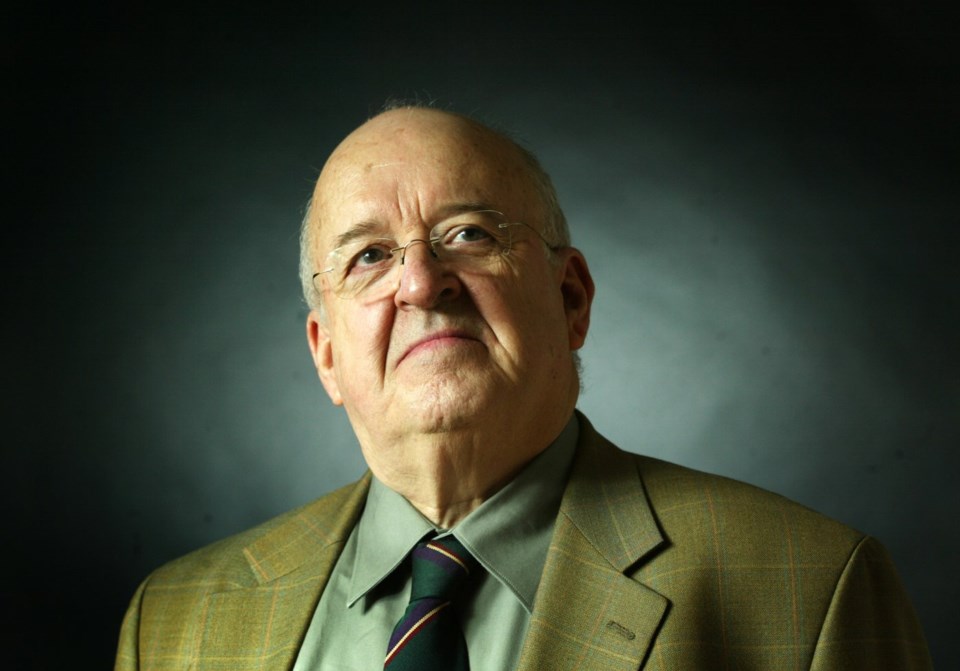TORONTO ŌĆö Lifelong journalist, broadcaster, author and editor Robert Fulford was remembered Wednesday as a prolific writer whose vibrant intellect and insatiable curiosity inspired colleagues and younger writers alike.
FulfordŌĆÖs son-in-law Stephen Marche said the former "Saturday Night" editor died Tuesday afternoon in Toronto surrounded by family. He was 92.
Marche said Fulford had suffered several health setbacks in his later years, including a stroke in his late 70s and vascular dementia in the past five years. The essayist and formidable editor leaves behind a staggering body of work spanning 72 years that included magazine and newspaper columns, arts reviews and books.
Fulford's career took him through virtually every major Toronto media outlet including Maclean's, the Toronto Star, CBC Radio, and National Post, and he spent nearly 20 years as editor of ŌĆ£Saturday Night,ŌĆØ which Marche described as a watershed for Canadian magazines under FulfordŌĆÖs watch.
Former colleague and friend John Fraser said FulfordŌĆÖs family protected his privacy as his health declined so that he would be remembered for his sharp mind and voracious intellectual appetite.
ŌĆ£He had a big public persona and that's the persona they wanted most people to remember,ŌĆØ said Fraser, executive chair of the National NewsMedia Council and former "Saturday Night" editor.
Marche, who is married to Fulford's daughter Sarah, said an unending fascination with the world also made Fulford a generous mentor to younger writers and ŌĆ£enormously fun to talk to." He recalled visiting Fulford's home to find high school kids seeking career advice.
A biography on FulfordŌĆÖs website lists a broad array of passions including jazz, the visual arts, architecture, city planning, museums, archeology, literature, theatre, film and politics.
He was born in Ottawa on Feb. 13, 1932 to Frances Fulford and A.E. Fulford, a journalist with The Canadian Press.
He grew up in Toronto where his neighbour and best friend was celebrated pianist Glenn Gould. Fulford began his career writing about high school sports at age 16 and producing a weekly teen radio show. He joined the Globe and Mail as a reporter at 18.
Fulford's books include the Expo '67 coffee table book ŌĆ£This Was ExpoŌĆØ and a 1968 collection of his columns, ŌĆ£Crisis at the Victory Burlesk: Culture, Politics and Other Diversions,ŌĆØ the 1974 collection ŌĆ£Marshall Delaney at the Movies: The Contemporary World as Seen on FilmŌĆØ and 1995ŌĆÖs ŌĆ£Accidental City: The Transformation of Toronto.ŌĆØ
Celebrated writer and editor Gary Ross, who edited Fulford for years at "Saturday Night," said Fulford never went to university but had a remarkable mind driven by insatiable curiosity "and interest in more things than you can imagine."
"It was an education to be around him," Ross said Wednesday.
"He knew so much it was remarkable. He formed opinions that were the result of critical thinking, not just passion or bias or whatever, and he articulated them with such grace and ease. It was astonishing."
Dianna Symonds, who helmed "Saturday Night" from 1999 to 2001, said Fulford brought her into the business as his assistant in 1982. One of her main tasks was to retype letters he wrote to other journalists and authors about their work or things that sparked his interest, giving her an extraordinary glimpse into his thoughts on the craft.
"He was a great role model," she said, pointing to "his open mindedness and his capacity to change his mind, his willingness to learn" as defining traits.
Like a lot of news people, Fraser said he and Fulford "were very big gossips," and Fulford, in particular, was a stimulating conversationalist who could talk about anything.
"We'd like to know everything about everything. But what I admired about him so much was that he was an unpretentious intellectual. In other words, he could write for the general public on quite serious things and bring ordinary readers along," he said.
"He was able to take something that was right in front of people's faces and turn it upside down and make them ponder what it was that they were missing and what they should know more about. And to me, that made him a great journalist, one who really made people think and to dig deeper into stories."
Marche said Fulford had a stroke in his late 70s that briefly took away his ability to talk. He not only rebounded but resumed writing.
"The doctors really did not think he was going to recover from it, and he fought his way back. They really did consider it a miracle that he was able to even speak after that, and he went back to column writing.ŌĆØ
Fulford leaves behind his wife and fellow journalist Geraldine Sherman, children James, Margaret, Rachel and Sarah, as well as his grandchildren.
This report by The Canadian Press was first published Oct. 16, 2024.
Cassandra Szklarski, The Canadian Press



